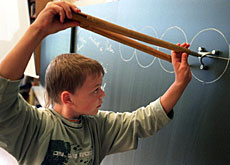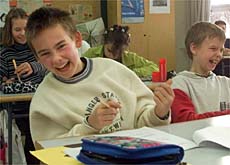Swiss invest heavily in teachers

Switzerland pumps more money into education than most other countries, according to a study by the Organisation for Economic Cooperation and Development (OECD).
Switzerland ranks fourth for spending on education after the United States, Denmark and Norway, with most of the money going on teachers’ salaries.
The 2004 edition of the OECD’s Education at a Glance report shows that the Swiss spend $8,800 (SFr11,100) annually per child on schooling compared with an OECD average of $6,200.
But while 90 per cent of Swiss complete secondary school education, fewer than 20 per cent go on to obtain a university degree.
The Federal Statistics Office said Swiss spending amounted to 5.3 per cent of GDP. It said above-average staff costs were one of the main reasons for the high level of spending.
High salaries
Teacher salaries are four to ten per cent higher than in other OECD countries and account for 85 per cent of costs at primary and secondary schools, and 77 per cent at universities and technical colleges.
Despite the substantial investment in education, Swiss pupils do not take home noticeably better report cards than their overseas counterparts.
The OECD’s Pisa report, published in 2001, placed Swiss pupils in 17th position in terms of reading skills and 18th for science. The Swiss did better in mathematics, finishing seventh out of 31 countries.
“We have to consider whether money is being spent in the right place with the right effects,” said Stefan Wolter of the Swiss Coordination Centre for Research in Education.
“With current budget restrictions, we have to improve our performance with the same funds.”
Other reasons given for high Swiss spending were infrastructure costs, small class sizes and the existence of four language regions.
“Other countries have only one language to deal with, while learning other languages is a priority in Switzerland,” Wolter told swissinfo.
Between 1995 and 2001, spending remained stable in Switzerland for primary and secondary education, whereas it rose in most of the other surveyed countries.
Higher education
Investment in tertiary education increased, mainly because of the creation of technical universities.
The Swiss population is considered to be generally well educated. According to the OECD, four out of five Swiss between the ages of 24 and 65 have a baccalaureate or have completed an apprenticeship compared with two thirds of adults in other countries.
In 2002, nine out of ten Swiss youngsters reached this level of education versus the OECD average of 81 per cent.
Passport to employment
Education also continues to prove its worth as a passport to employment. In Switzerland, women who have studied beyond compulsory school see their chances of employment significantly increased.
Three out of four women who have reached baccalaureate level have a job, versus 60 per cent of those who have only completed compulsory schooling. Eighty per cent of women with a university degree are in work, as are 94 per cent of men.
Further education also affects salaries. As in most other countries, holders of a university degree earn on average one and a half times more than those with only a school-leaving certificate.
swissinfo with agencies
Switzerland spends over SFr11,000 annually for each student, SFr3,000 more than the OECD average.
Total spending for education exceeded SFr22 billion in 2000, representing nearly 18 per cent of public spending.
Four out of five adults have completed an apprenticeship or have a baccalaureate.
But just one in five complete a tertiary degree.

In compliance with the JTI standards
More: SWI swissinfo.ch certified by the Journalism Trust Initiative











You can find an overview of ongoing debates with our journalists here . Please join us!
If you want to start a conversation about a topic raised in this article or want to report factual errors, email us at english@swissinfo.ch.